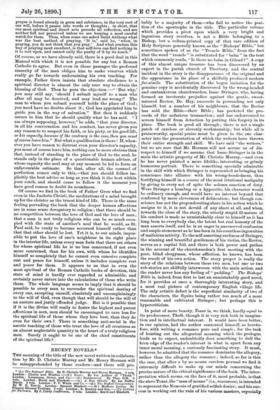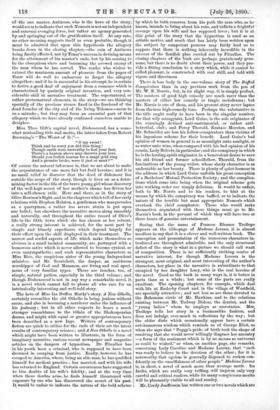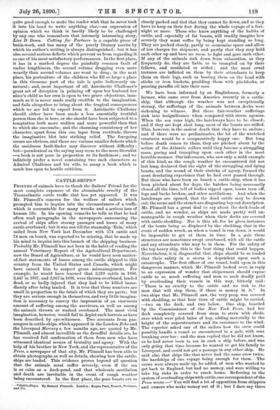RECENT NOVELS.* THE meaning of the title of the new
novel written in collabora- tion by Mr. D. Christie Murray and Mr. Henry Herman will be misapprehended by those readers—and there will pro-
• (L) The Bishops' BZie. By D. Christie Murray and Henry Herman. 3 vols. London : Chatto and Windtts. —(2 ) Toxar. By the Author of "Thoth." London : Longman, Green, and Co.--(3.) Dishonoured By Theo Gift. 3 vole. London : Hurst and Blackett.-14.) A New Othello. By Ian Duffus Hardy. 3 vols. London : F. v. White and Co.—(5.) The Baffled Conspirators By W. E. Norris. London : Spencer Blaokett.—(6) Madame Leroux. By Frances Eleanor Trollope. 3 vols. London: B. Bentley and Bon.—(7.) Cutting for Partners. By J. Cordy Zeaffreson. 3 vols. London: Hurst and Blaokett.
bably be a majority of them—who fail to notice the posi- tion of the apostrophe in the title. The particular volume which provides a pivot upon which a very bright and ingenious story revolves, is not a Bible belonging to a Bishop, but a vellum-printed copy of that rare edition of Holy Scripture generally known as the "Bishops' Bible," but sometimes spoken of as the " Treacle Bible," from the fact that the word " treacle " is substituted for " balm " in the text which commonly reads, " Is there no balm in Gilead P" A copy of this almost unique treasure has been discovered by an expert in the parish church of Thorbury, and the central incident in the story is the disappearance of the original and the appearance in its place of a skilfully produced modern fac-simile. The substitution of the bogus imitation for the genuine copy is accidentally discovered by the wrong-headed and cantankerous churchwarden, Isaac Stringer, who, having formed an inveterate prejudice against the gentle, sweet- natured Rector, Dr. Hay, succeeds in persuading not only himself, but a number of his neighbours, that the Rector has sold the Bible—their Bible ; has pocketed the pro- ceeds of the nefarious transaction ; and has endeavoured to screen himself from detection by putting this forgery in its place. The book is good all through ; there is not a single patch of careless or slovenly workmanship ; but while all is praiseworthy, special praise must be given to the one char- acter into the presentation of which the writers have thrown their entire strength and skill. We have said " the writers," but we are sure that Mr. Herman will not accuse us of dis- respect to himself if we assume that Isaac Stringer is in the main the artistic property of Mr. Christie Murray,—and even he has never painted a more lifelike, interesting, or grimly humorous portrait. There is something specially admirable in the skill with which Stringer is represented as bringing his conscience into alliance with his wrong-headedness, thus fortifying himself in a course of the most irrational malignity by giving to every act of spite the solemn sanction of duty. Were Stringer a humbug or a hypocrite, his character would be ordinary enough, and would have no interest beyond that conferred by mere cleverness of delineation; but though con- science has not the preponderating share in his action which he assigns to it, it is not devoid of any share at all, and when, towards the close of the story, the utterly stupid ill-nature of his conduct is made as unmistakably clear to himself as it has long been to everybody else, the latent but real honesty of the man asserts itself, and he is as eager in unreserved confession and ample atonement as he has been in his countless ingenuities of malicious activity. To the self-asserting surliness of Stringer, the winning and beautiful gentleness of his victim, the Rector, serves as a capital foil, and there is both power and pathos in the account of the churchwarden's first meeting with the poor, blind clergyman, whose affliction, he knows, has been the result of his own action. The story proper is really the story of the relations between these two men, but one or two sub-stories are skilfully interwoven with the main action, and the reader never has any feeling of " padding." The Bishops' Bible is, indeed, from first to last an unmistakably good novel, for it provides at once a thoroughly interesting story, and a most real picture of contemporary English village life. The only artistic defect is the superficial similarity of two of the characters, the Squire being rather too much of a more reasonable and cultivated Stringer ; but perhaps this is hypercriticism.
In point of mere beauty, Tozar is, we think, hardly equal to its predecessor, Thoth, though it is very rich both in imagina- tion and in intellectual interest. It would have been better,. in our opinion, had the author contented himself, as hereto- fore, with writing a romance pure and simple; for the task of hunting out the allegorical meaning which the prologue leads us to expect, undoubtedly does something to dull the keen edge of the reader's interest in what is, apart from any inner moral meaning, a curiously fascinating story. It must,. however, be admitted that the romance dominates the allegory, rather than the allegory the romance ; indeed, so far is this the case, that after a by no means careless perusal we find it extremely difficult to make up our minds concerning the precise nature of the ethical significance of the book. The inter-. pretation which seems, on the face of it, most probable, is that the slave Toxar, the "man of means" (i.e., resources), is intended to represent the Nemesis of gratified selfish desire ; and his suc- cess in working out the ruin of his various masters, especially
of the one master, Antinous, who is the hero of the story, would seem to indicate that such Nemesis ismot an independent and external avenging force, but rather an agency generated by and springing out of the gratification itself. At any rate, no other meaning suggests itself as even probable, though it must be admitted that upon this hypothesis the allegory breaks down in the closing chapter,—the ruin of Antinous being finally effected, not by Toxar's success in devising means for the attainment of his master's ends, but by his ceasing to be the obsequious slave and becoming the avowed enemy of the man whom he has served. The reader who wishes to extract the maximum amount of pleasure from the pages of Toxar will do well to endeavour to forget the allegory altogether; and if he is successful in his attempt, he is certain to derive a good deal of enjoyment from a romance which is characterised by quaintly original invention, and very con- siderable skill in narrative treatment. The supernatural, or rather preternatural elements, in the story—we are thinking specially of the precious stones fixed in the forehead of the dead founder of the city and of the living Telemos—seem to us a mistake ; but they may form an essential part of that allegory which we have already confessed ourselves unable to decipher.
Miss Theo Gift's capital novel, Dishonoured, has a some- what misleading title and motto, the latter taken from Robert Browning's " The Worst of It :"— " 0 my sweet !
Think and be sorry you did this thing !
Though earth were unworthy to feel your feet, There's a heaven above may deserve your love. Should you forfeit heaven for a snapt gold ring And a promise broke, were it just or meet ? '
Of course the natural inference is, that we are about to make the acquaintance of one more fair but frail heroine; and it is no small relief to discover that the deed of dishonour lies outside the scope of the story, though it lives on as a deter- mining factor in the life of the brave young girl whose discovery of the well-kept secret of her mother's shame has driven her into a self-chosen exile. Here and there, as in the story of Olive Benison's flight, and in the chapters which tell of her early relations with Stephen Ralston, a gentleman who masquerades as a quarryman, a rather too severe strain is put upon our belief ; but elsewhere the narrative moves along smoothly and naturally, and throughout the entire record of Olive's life in the little town which she has chosen as her retreat, a really strong interest is achieved, for the most part by simple and homely expedients which depend largely for their effect upon the skill displayed in their treatment. The narrow and sordid aspects of life which make themselves so obvious in a small isolated community, are portrayed with a humorous satire which is never allowed to become cynical, or even unsympathetic ; and such representative characters as Miss Rice, the suspicious sister of the young Independent minister, and Mr. Scratchett, the draper, an assiduous worshipper of God and Mammon, are living and real speci- mens of very familiar types. There are touches, too, of
simple, natural pathos, especially in the third volume ; and though Dishonoured is not in any way a remarkable novel, it is a novel which cannot fail to please all who care for an intrinsically interesting and well-told story.
The hero of Miss Iza Duffus Hardy's story, A New Othello, certainly resembles the old Othello in being jealous without cause, and also in becoming a murderer under the influence of his jealousy ; but in all other respects he bears a much stronger resemblance to the villain of the Shakespearian drama, and might with equal or greater appropriateness have been described as a new Iago. Writers of contemporary fiction are quick to utilise for the ends of their art the latest results of contemporary science ; and A New Othello is a novel which might have been written to illustrate, in the form of imaginary narrative, various recent newspaper and magazine articles on the dangers of hypnotism. Dr. Fitzallan has in his youth been a criminal, who is supposed to have been drowned in escaping from justice. Really, however, he has escaped to America, where, being an able man, he has qualified
himself for medical practice ; has married, and with his wife has returned to England. Certain occurrences have suggested to him doubts of his wife's fidelity ; and at the very time when these doubts arise, he finds himself threatened with exposure by one who has discovered the secret of his past. Ittwould be unfair to indicate the nature of the bold scheme by which he both removes from his path the man who, as he knows, intends to bring about his ruin, and inflicts a frightful revenge upon his wife and her supposed lover; but it is at this point of the story that the hypnotism is used as an artistic motive, and much that has lately been written upon the subject by competent persons may fairly lead us to suppose that there is nothing inherently incredible in the success of the fiendish plan carried out by Fitzallan. The closing chapters of the book are perhaps gratuitously grue- some, but there is no doubt about their power; and they pro- vide a fitting conclusion to a story which, while it cannot be called pleasant, is constricted with real skill, and told with vigour and directness.
There is less body in the one-volume story of The Baffled Conspirators than in any previous work from the pen of Mr. W. E. Norris ; but, in its slight way, it is simply perfect. The masters of good high comedy are much rarer than the masters of either low comedy or tragic melodrama; but Mr. Norris is one of them, and his present story never lapses from the true high-comedy tone. Perhaps the substantive in the title ought really to have been in the singular number, for that wily misogynist, Lord Guise, is the sole originator of the cunningly devised anti-matrimonial, or rather anti- betrothal, club ; and Percy Thorold, Eustace Moreton, and Mr. Schneider are less his fellow-conspirators than victims of his ingenious scheme for their benefit. Lord Guise's bad opinion of women in general is as moonlight unto sunlight, or as water unto wine, when compared with his bad opinion of his cousin, Lady Belvoir, in particular ; and the conspiracy in which he is the leading spirit originates in a benevolent desire to save his old friend and former schoolfellow, Thorold, from the fascinations of the young widow, whose shady character is as undeniable as her beauty. There is plenty of quiet humour in the address in which Lord Guise unfolds his great conception of a Bachelors' Mutual Protection Society; and the complica- tions which come into being when the original scheme gets into working order are simply delicious. It would be unfair, both to Mr. Norris and to his readers, to hint at the means by which the conspiracy was baffled, or to indicate the nature of the terrible but most appropriate Nemesis which overtook the chief conspirator. Those who would make themselves acquainted with these things must go to Mr. Norris's book, in the perusal of which they will have two or three hours of genuine entertainment.
Seeing that the name of Frances Eleanor Trollope appears on the title-page of Madame Leroux, it is almost needless to say that it is a clever and well-written book. The conception and presentation of the numerous characters in- troduced are throughout admirable, and the only structural defect of the story is what in a picture we should call want of composition. There is no sufficiently striking centre of narrative interest, for though Madame Leroux is the strongest, most original, and most interesting of the author's characters, her place in the narrative is subordinate to that occupied by her daughter Lucy, who is the real heroine of the novel. Good as the book in many ways is, it is better in parts than as a whole ; but some of the parts are really excellent. The opening chapters, for example, which deal with life at Enderby Court and in the village of Westfield, are specially attractive ; and not less so are those devoted to the Bohemian circle of Mr. Hawkins, and to the relations existing between Mr. Tudway Didear, the dentist, and the " young ladies " whom he employs as secretaries. Mrs. Trollope tells her story in a businesslike fashion, and does not indulge over-much in reflections by the way ; but the obiter dicta which occasionally appear have a certain sub-humorous wisdom which reminds us of George Eliot, as when she says that " Peggy's pride of birth took the shape of resolving that she would never willingly disgrace her ancestry —a form of the sentiment which is by no means so universal as could be wished," or when, on another page, she remarks, concerning Lady Caroline and Madame Leroux, that "each was ready to believe in the devotion of the other ; for it is noteworthy that egoism is generally disposed to reckon con- fidently on the unselfishness of other people." Madame Leroux is, in short, a novel of much more than average merit. Its faults, which are really very trifling, will impress only very careful and critical readers, while its many conspicuous merits will be pleasantly visible to all and sundry.
Mr. Cordy Jeaffreson has written one or two novels which are quite good enough to make the reacler wish that he never took it into his head to write anything else,—an expression of opinion which we think is hardly likely to be challenged by any one who remembers that intensely interesting story, Live It Down. Cutting for Partners is a capable piece of brain-work, and has many of the purely literary merits by which its author's writing is always distinguished ; but it has also several serious defects which prevent us from regarding it as one of his most satisfactory performances. In the first place, it has in a marked degree the painfully common fault of undue lengthiness, the second volume dragging even more wearily than second volumes are wont to drag ; in the next place, his portraiture of the children who fill so large a place in this tiresome part of the tale is quite ludicrously un- natural ; and, most important of all, Antoinette Challoner's great act of deception in palming off upon her husband her niece's child as her own is open to two grave objections, inas- much as it is never made really credible to the imagination, and fails altogether to bring about the tragical consequences which we are led to expect from it. Antoinette Challoner should either have been made a less essentially truthful person than she is here, or she should have been subjected to a temptation both more sudden and more powerful than that to which she succumbs; and the charming consistency of her character, apart from this one lapse from rectitude, throws the imaginative blot into striking relief. The foregoing errors are obvious, and there are various smaller defects which the assiduous fault-finder may discover without difficulty ; but—paradoxical as the saying may seem to the mere literalist —a book is not poor in proportion to its faultiness ; and we infinitely prefer a novel containing two such characters as Admiral Challoner and his wife, to many a book which is much less open to hostile criticism.




































 Previous page
Previous page